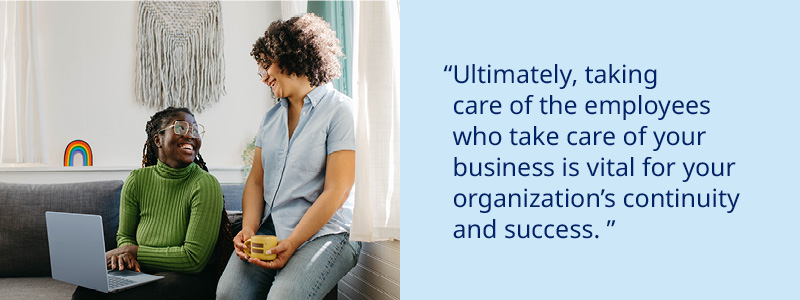Blog
How Talent Mobility Can Counter the “Great Reshuffle”
It has been more than two years since the global COVID-19 pandemic emerged, causing a profound impact on the structure of the global workforce.
The resulting actions of what companies initially implemented as reactive measures to protect employees and halt the spread of the virus have essentially resulted in changes to virtually every aspect of how we work.
Working from home or remote working scenarios have become more commonplace. Employees have grown accustomed to greater flexibility and work-life balance, and some even to living where they choose with no intention of returning to an office setting. As organisations work to determine which workforce structure is best for the business, while trying to embrace the needs of their employees, dichotomies in approach have been emerging.
Employee Attitudes Toward Work Have Shifted
Employee experiences throughout the pandemic have resulted in rethinking the way they want to work and where they want to work. In 2021, more than 47 million people left their jobs. If the numbers are any indication, employees are more reluctant to stay in a role in which they are unhappy or find little job satisfaction. Whether you call it the “Great Resignation” or the “Great Reshuffle” or the “Great Reassessment”, or something else entirely, the result has been tremendous talent management challenges around the world.

This trend is the result of numerous factors affecting the overall workforce throughout the pandemic. Workers may have simply reached a breaking point after months of high workloads, hiring freezes, working more hours, and other pressures, causing them to rethink their career goals. Resignation rates are also higher amongst employees who worked in fields that experienced extreme increases in demand due to the pandemic, likely causing increased workloads and burnout. Some employees wanted to continue working remotely rather than commuting back to an office, and others were exhausted by lack of connection and digital overload.
It’s a job seeker’s market, and employees have the confidence that they can find better work. Employees are seeking greater freedom, flexibility and attention to their well-being. Organisations are scrambling to assess and reinvent their workforce structure, policies and culture to be more appealing to both current and new talent. As a result, attracting and retaining the right talent to fill key roles is more challenging, and important, now than ever.
Using Employee Relocation to Attract and Retain Talent
According to LinkedIn Global Talent Trends, 59% of survey respondents cited that professional development opportunities are one of the key areas they are looking for in a company culture, followed by flexible work support (48%) and mental health and wellness (42%). Therefore, it isn’t a reach to think that talent mobility could be your answer to attracting and retaining talent in today’s competitive and evolving workforce.

Areas to Improve Company Culture
With an increasingly competitive global talent pool, which was further exacerbated by the pandemic, there is a significant struggle for talent across many industries on a global level. Organisations are highly dependent on skilled employees as they ramp up their operations or expand their businesses. They need to have the right skills in the right place at the right time. There is no better time than now for organisations to explore relocating employees as a track to nurture and retain the best talent. Employee relocation is not just essential for modern business growth, but it is also a golden opportunity for employees to experience a different work environment, culture, and a way for organisations to invest in their current talent pool.
As organisations embark on the journey of relocating their employees, an enhanced level of employee support may be necessary. However, many struggle to find the right balance between delivering a positive mobility experience while keeping costs under control. If your organisation finds itself in this this position, read our recent article, Striking a Balance: Delivering a Positive Mobility Experience and Controlling Costs, which highlights why the employee experience should be a main focus for organisations.
Duty of Care: Prioritising Employee Mental Health and Well-Being
Duty of care support has been evolving since the pandemic, moving beyond compliance and safety to providing contingency support for those occasions when a normal path of support cannot be followed.
Contingency strategies are critical to remobilising talent in the world we live in today. Anticipating the disruptors that might affect employees and having various plans in place ready to seamlessly support the employee and their family, is critical for any mobility programme. During the pandemic, many organisations identified and defined acceptable contingency support for different services and situations. Ultimately, taking care of the employees who take care of your business is vital for your organisation’s continuity and success.

Similarly, our clients have seen how the effects of the pandemic have negatively affected their staff. To provide even better care, we worked closely to review their policies to suit the evolving dynamics of the workplace. Due to the pandemic, many organisations have pivoted to working-from-home arrangements. As an example, to ensure employees can balance mental wellness and work productivity, one of our large global clients adjusted their accommodation budgets so their relocating employees could enjoy larger living spaces, access to better fitness and wellness facilities, and work in greater comfort. Additionally, our client kickstarted the process of expanding their relocation benefits for employees on a permanent relocation programme to cover their family as well. Another adjustment occurred when Hong Kong imposed stricter measures to contain the rapidly rising COVID-19 cases, and one client agreed to provide support for employees relocating to Hong Kong with no budget constraints when they are placed in quarantine.
Organisations have been thrust into an unprecedented moment in the history of work as employees are rethinking about how and why they work. To keep up with changing attitudes toward work, and to avoid losing key talent, organisations must now assess and adjust their talent management strategy to retain the best talent. It is vital to provide a competitive edge in terms of career progression and employee welfare, and talent relocation is one way to achieve that goal.
Customising Relocation Programme for Employees
To better attract and retain talent, a more customised approach to relocation programmes is necessary with a focus on employee development opportunities, the well-being of the employee and their families, and the flexibility to meet their unique needs. Organisations that fail to address the unique needs of their top talent will end up losing their most valuable employees.

SIRVA can provide benchmarking and best practice recommendations to help your organisation remain competitive and attractive to job seekers. In addition, we can assist with programme structure and policy development that aligns with the differing segments of your mobile population and overall organisational objectives. We also have a wealth of data analytics and industry insights which we can draw on to help create action plans and rapid responses. For example, our client – an American computer manufacturing company – needed to relocate US-based assignees into China to ensure its business continuity but faced issues due to border closures. Their partnership with SIRVA led to the introduction of a more flexible and enhanced short-term assignment framework. This was specifically designed to help improve the employee experience and encourage higher take-up rates during these difficult times.
We understand the importance of having a committed and dedicated workforce, and we work closely with your employees and HR team to craft the most ideal relocation package. What better way is there to let your employees know that you are addressing their needs, and the needs of their loved ones, than by having their voices heard through a customised relocation plan that supports their unique situation?
To find out how SIRVA can assist in your employee relocation programme, drop us an email at concierge@sirva.com.
Contributors
Girlie Velasquez, Director, Global Account Management
Recommended reading:

